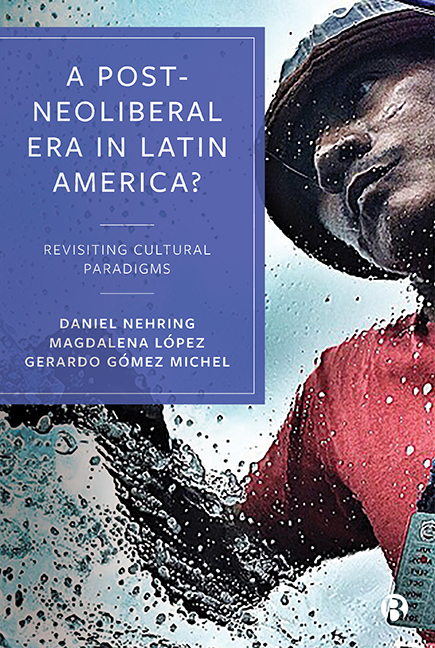Book contents
- Frontmatter
- Contents
- List of Tables and Figures
- Notes on Contributors
- 1 Introduction: Everyday Life in (Post-)Neoliberal Latin America
- 2 Imaginaries, Sociability and Cultural Patterns in the Post-Neoliberal Era: A Glance at the Argentinean, Paraguayan, and Venezuelan Experiences
- 3 Making Neoliberal Selves: Popular Psychology in Contemporary Mexico
- 4 From Uribe’s “Democratic Security” to Santo’s Peace Accords with the FARC: Hate, Fear, Hope and other Emotions in Contemporary Colombian Politics
- 5 Cine Bajo Tierra: Ecuador’s Booming Underground Cinema in the Aftermath of the Neoliberal Era
- 6 Neoliberalising Humanity: Culture and Popular Participation in the Case of the Street Market of Caruaru, Brazil
- 7 The Contribution of the Catholic Magazine Espacio Laical and the Constitution to the Cuban Public Sphere
- 8 Argentina: The Philosophical Resistance to the Conquest of the Soul1
- 9 Fleeing (Post-)Chávez Memories: The 1990s and the Black Friday Generation
- 10 Re-imagined Community: The Mapuche Nation in Neoliberal Chile
- 11 Neoliberalism and the Negotiation of the American Dream in Contemporary Latina Narratives
- 12 Bare Life in Contemporary Mexico: Everyday Violence and Folk Saints
- Index
6 - Neoliberalising Humanity: Culture and Popular Participation in the Case of the Street Market of Caruaru, Brazil
Published online by Cambridge University Press: 20 April 2022
- Frontmatter
- Contents
- List of Tables and Figures
- Notes on Contributors
- 1 Introduction: Everyday Life in (Post-)Neoliberal Latin America
- 2 Imaginaries, Sociability and Cultural Patterns in the Post-Neoliberal Era: A Glance at the Argentinean, Paraguayan, and Venezuelan Experiences
- 3 Making Neoliberal Selves: Popular Psychology in Contemporary Mexico
- 4 From Uribe’s “Democratic Security” to Santo’s Peace Accords with the FARC: Hate, Fear, Hope and other Emotions in Contemporary Colombian Politics
- 5 Cine Bajo Tierra: Ecuador’s Booming Underground Cinema in the Aftermath of the Neoliberal Era
- 6 Neoliberalising Humanity: Culture and Popular Participation in the Case of the Street Market of Caruaru, Brazil
- 7 The Contribution of the Catholic Magazine Espacio Laical and the Constitution to the Cuban Public Sphere
- 8 Argentina: The Philosophical Resistance to the Conquest of the Soul1
- 9 Fleeing (Post-)Chávez Memories: The 1990s and the Black Friday Generation
- 10 Re-imagined Community: The Mapuche Nation in Neoliberal Chile
- 11 Neoliberalism and the Negotiation of the American Dream in Contemporary Latina Narratives
- 12 Bare Life in Contemporary Mexico: Everyday Violence and Folk Saints
- Index
Summary
Introduction
The Caruaru Market
provides us a very pleasant sight.
It sells everything in the world.
The Caruaru Market.
(“A Feira de Caruaru” [The Market of Caruaru] by the composer Onildo Almeida)
Neoliberalism is not merely one of the main theoretical strands of contemporary thought. It also transcends the economic model that has given new breath to laissez-faire. Neoliberalism manifests itself dynamically through the everyday forms of subjects’ thoughts and actions, in the constant reconstruction of public and private spaces, in the daily choices that modulate levels of equality and social justice, in the urbanization of cities, in the distribution of goods and power struggles, which often take place without an explicit and direct connection with the abstract concepts of theory. Neoliberalism shapes society itself and only makes sense as an effective set of political actions and contexts. Real subjects live and practice neoliberalism! This “everyday application of the theory” is often not perceived as neoliberal values (individualism, freedom, minimal state interference, defense of capitalism) are unconsciously practiced by the agents themselves (from ordinary people to politicians). This can be partly explained by the force of the neoliberal rhetoric of progress and economic prosperity itself: neoliberalism presents itself as the natural and most favorable proposal for any person. Any discourse against freedom in the market, or against any other issues (environment, education, security) where the freedom of individuals is at stake, automatically becomes a discourse against justice. The pragmatic naturalism of this fallacy seems to be so advantageous to the individual that it excuses neoliberalism from announcing itself explicitly on the stage of social life, as if the ethics of such a model was self-evident. For many, to propose alternatives to this model would be illogically equivalent to acting against oneself and against others. That is why neoliberalism is more than a normative ideal and a transition to an alternative post-neoliberal model requires more than a mere theoretical impulse, but rather a strong reaction against this production of subjectivity. It is important to recognize, therefore, that neoliberalism not only shapes society by theoretical arguments, but also that its principles are countered or sustained by the way the web of power relationships is configured, horizontally and vertically, between social actors and institutions.
- Type
- Chapter
- Information
- A Post-Neoliberal Era in Latin America?Revisiting Cultural Paradigms, pp. 115 - 134Publisher: Bristol University PressPrint publication year: 2019



